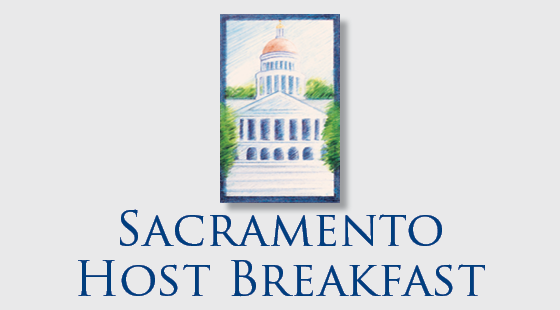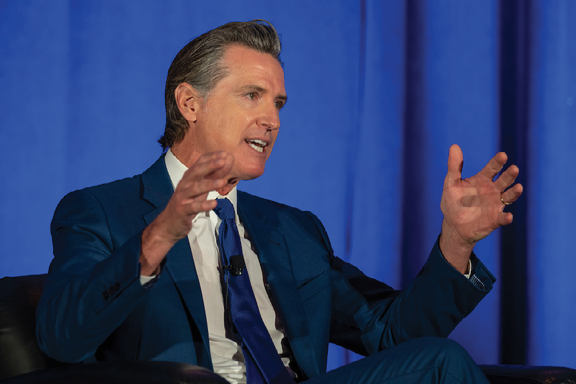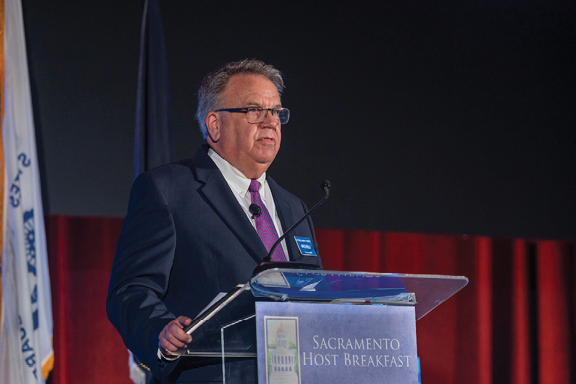
California’s infrastructure needs and ability to find innovative solutions were highlighted last week in remarks at the 97th Annual Sacramento Host Breakfast.
California Governor Gavin Newsom stressed the importance of streamlining the state’s infrastructure permitting processes to the breakfast audience of close to 1,000 civic and business leaders from throughout the state.
Preceding the Governor on the speakers’ platform at the May 18 gathering, California Chamber of Commerce Board Chair Gregory S. Bielli emphasized the importance of collaboration and leadership for a better California.




Infrastructure
Expediting infrastructure projects was one of the issues Governor Newsom discussed in a question-and-answer exchange with CalChamber President and CEO Jennifer Barrera.
The Governor asserted that progress was being made to reforming some aspects of the California Environmental Quality Act (CEQA) and said his office would soon announce streamlining, permitting and judicial reforms (see story).
These reforms will be critical to taking advantage of $180 billion in federal infrastructure funding.
“[The $180 billion in funding is] one of the most significant investments in California’s history. And the only thing that gets in the way is a world we invented. And that’s process and delay and manipulation,” Governor Newsom said.
Green Technology
Asked about the state’s climate goals, the Governor touted California’s leadership in carbon neutrality. The state has invested in a wide range of green technologies, such as battery storage, carbon capture, green hydrogen and more.
In fact, the state is converting old industrial facilities into large bio green facilities, creating thousands of jobs and bringing in billions of dollars of investment, he said.
The transition to green energy is going to be “the biggest transformation in our lifetime,” the Governor said, and California is poised to dominate the transition.
“…we dominate in this space; it’s one of our biggest exports,” he said. “This is…the one thing that I think separates our game from the game played almost anywhere else and is one of the greatest economic opportunities of our lifetime.”
The Governor also cautioned against forgetting how great the state is. The state still dominates in “every major category,” he said.
He pointed out that California is the No. 1 state for manufacturing, agriculture, hunting and forestry jobs, two-way trade and direct foreign trade. California has 51% more startups, and since the last two decades, more than half of the venture capital in the U.S. is coming out of California.
“Our home state, the Golden State, in the next few decades will be a golden era of California if we maintain our wits, maintain our confidence, and continue to accelerate our nation-leading policies,” Governor Newsom said.
Pay Equity
The discussion closed on the issue of pay equity, and Governor Newsom thanked the CalChamber for signing California’s Equal Pay Pledge.
Family- and women-friendly workplace policies are a “no-brainer” and foster company growth and success, he said. California is making gains in this area, with the percentage of women serving on corporate boards doubling to 33% since 2018.
While the percentage is not where it needs to be, the Governor pointed out that California has the most woman-owned businesses in the country.
“And we haven’t even gotten started,” he added.
Tejon Ranch
Bielli, president and CEO of Tejon Ranch Company, gave a summary of the rich historical significance of Tejon Ranch, including its connection to the California gold rush, and its strategic location as a vital link between Southern and Northern California (see full text of Bielli’s remarks).
Spanning 270,000 acres in Kern and Los Angeles Counties, Tejon Ranch is the largest single expanse of private property in California. In 2008, Tejon Ranch Company made an agreement with environmental organizations to set aside 240,000 acres (90%) for conservation while allowing for development on 10% of the land.
Bielli acknowledged the challenges in the entitlement process but mentioned the successful local approvals for 35,000 residential units. He emphasized Tejon Ranch’s commitment to conservation and its positive impact on carbon capture.
California a Leader in Innovation
While the state has its challenges, Bielli said, it is important to remember that California does a lot of things well.
“California is a global crossroads, for people, goods and services,” he said.
International trade, for example, is California’s “lifeblood” and contributes to a quarter of all jobs in the state, he said. Bielli highlighted the successful 2023 California Japan trade mission led by Lieutenant Governor Eleni Kounalakis, which showcased the state’s commitment to international trade and collaboration.
Bielli also lauded the University of California, California State University, and California’s 116 community colleges as being the reason California is a leader in innovation.
Productive Solutions
While acknowledging the challenges of doing business in California, Bielli emphasized that the CalChamber is focused on offering productive solutions on public policies.
He highlighted a 2024 ballot initiative to address burdensome Private Attorneys General Act (PAGA) lawsuits, which often result in significant liabilities for employers for trivial mistakes.
“The business community is working to educate voters and policymakers about the fact that workers aren’t winning PAGA claims—trial attorneys are,” he said.
Bielli also addressed the state’s water supply challenges, noting that despite recent rainfall, long-term solutions are necessary to meet the diverse needs of farmers, residents, and industries while supporting natural habitats. Comprehensive improvements in the state’s water reliability, he said, include off-stream storage, desalination, recycling, basin management with direct injection projects to stabilize basins, and efficiencies that can serve the state’s growth.
Lastly, Bielli touched on the state’s high cost and low availability of housing, which is a significant cause of poverty and contributes to the state’s population exodus.
“Growing the net worth of our families through home ownership needs to be a goal that we all embrace,” he said. “We have all enjoyed it in our lives. Why then can’t we pass this joy and financial security on to our children?”
In closing, Bielli urged leaders to approach the state’s issues with a determination to find practical solutions that benefit all Californians.
“Let’s get down to the serious work of finding the common ground—the pathway—that will provide more and better opportunities for California and Californians,” he said.

